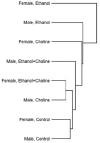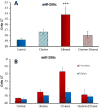Postnatal choline supplementation selectively attenuates hippocampal microRNA alterations associated with developmental alcohol exposure
- PMID: 28433422
- PMCID: PMC5559286
- DOI: 10.1016/j.alcohol.2016.12.006
Postnatal choline supplementation selectively attenuates hippocampal microRNA alterations associated with developmental alcohol exposure
Abstract
Prenatal alcohol exposure can result in a range of physical, neuropathological, and behavioral alterations, collectively termed fetal alcohol spectrum disorders (FASD). We have shown that supplementation with the nutrient choline reduces the severity of developmental alcohol-associated deficits in hippocampal-dependent behaviors and normalizes some aspects of hippocampal cholinergic development and DNA methylation patterns. Alcohol's developmental effects may also be mediated, in part, by altering microRNAs (miRNAs) that serve as negative regulators of gene translation. To determine whether choline supplementation alters ethanol's long-lasting effects on miRNAs, Sprague-Dawley rats were exposed to 5.25 g/kg/day ethanol from postnatal days (PD) 4-9 via intubation; controls received sham intubations. Subjects were treated with choline chloride (100 mg/kg/day) or saline vehicle subcutaneously (s.c.) from PD 4-21. On PD 22, subjects were sacrificed, and RNA was isolated from the hippocampus. MiRNA expression was assessed with TaqMan Human MicroRNA Panel Low-Density Arrays. Ethanol significantly increased miRNA expression variance, an effect that was attenuated with choline supplementation. Cluster analysis of stably expressed miRNAs that exceeded an ANOVA p < 0.05 criterion indicated that for both male and female offspring, control and ethanol-exposed groups were most dissimilar from each other, with choline-supplemented groups in between. MiRNAs that expressed an average 2-fold change due to ethanol exposure were further analyzed to identify which ethanol-sensitive miRNAs were protected by choline supplementation. We found that at a false discovery rate (FDR)-adjusted criterion of p < 0.05, miR-200c was induced by ethanol exposure and that choline prevented this effect. Collectively, our data show that choline supplementation can normalize disturbances in miRNA expression following developmental alcohol exposure and can protect specific miRNAs from induction by ethanol. These findings have important implications for the mechanisms by which choline may serve as a potential treatment for FASD.
Keywords: Choline; Fetal alcohol; Genetic; Intervention; miRNA.
Copyright © 2017 Elsevier Inc. All rights reserved.
Figures





Similar articles
-
The effects of perinatal choline supplementation on hippocampal cholinergic development in rats exposed to alcohol during the brain growth spurt.Hippocampus. 2012 Aug;22(8):1750-7. doi: 10.1002/hipo.22009. Epub 2012 Mar 19. Hippocampus. 2012. PMID: 22431326 Free PMC article.
-
Prenatal choline supplementation mitigates the adverse effects of prenatal alcohol exposure on development in rats.Neurotoxicol Teratol. 2009 Sep-Oct;31(5):303-11. doi: 10.1016/j.ntt.2009.07.002. Epub 2009 Jul 16. Neurotoxicol Teratol. 2009. PMID: 19616089 Free PMC article.
-
Adolescent Choline Supplementation Attenuates Working Memory Deficits in Rats Exposed to Alcohol During the Third Trimester Equivalent.Alcohol Clin Exp Res. 2016 Apr;40(4):897-905. doi: 10.1111/acer.13021. Alcohol Clin Exp Res. 2016. PMID: 27038598 Free PMC article.
-
What choline metabolism can tell us about the underlying mechanisms of fetal alcohol spectrum disorders.Mol Neurobiol. 2011 Oct;44(2):185-91. doi: 10.1007/s12035-011-8165-5. Epub 2011 Jan 25. Mol Neurobiol. 2011. PMID: 21259123 Free PMC article. Review.
-
New therapeutics for the prevention or amelioration of fetal alcohol spectrum disorders: a narrative review of the preclinical literature.Am J Drug Alcohol Abuse. 2024 Nov;50(6):749-770. doi: 10.1080/00952990.2024.2361442. Epub 2024 Jul 18. Am J Drug Alcohol Abuse. 2024. PMID: 39023419 Review.
Cited by
-
Cholinergic and Neuroimmune Signaling Interact to Impact Adult Hippocampal Neurogenesis and Alcohol Pathology Across Development.Front Pharmacol. 2022 Mar 2;13:849997. doi: 10.3389/fphar.2022.849997. eCollection 2022. Front Pharmacol. 2022. PMID: 35308225 Free PMC article. Review.
-
Postnatal Choline Supplementation Rescues Deficits in Synaptic Plasticity Following Prenatal Ethanol Exposure.Nutrients. 2022 May 10;14(10):2004. doi: 10.3390/nu14102004. Nutrients. 2022. PMID: 35631142 Free PMC article.
-
Nutrient Supplementation during the Prenatal Period in Substance-Using Mothers: A Narrative Review of the Effects on Offspring Development.Nutrients. 2023 Jun 30;15(13):2990. doi: 10.3390/nu15132990. Nutrients. 2023. PMID: 37447316 Free PMC article. Review.
-
The ameliorative effects of choline on ethanol-induced cell death in the neural tube of susceptible BXD strains of mice.Front Neurosci. 2023 Sep 18;17:1203597. doi: 10.3389/fnins.2023.1203597. eCollection 2023. Front Neurosci. 2023. PMID: 37790585 Free PMC article.
-
Where Epigenetics Meets Food Intake: Their Interaction in the Development/Severity of Gout and Therapeutic Perspectives.Front Immunol. 2021 Sep 17;12:752359. doi: 10.3389/fimmu.2021.752359. eCollection 2021. Front Immunol. 2021. PMID: 34603340 Free PMC article. Review.
References
-
- Abel EL. An update on incidence of FAS: FAS is not an equal opportunity birth defect. Neurotoxicology and Teratology. 1995;17(4):437–443. - PubMed
-
- Albright CD, Friedrich CB, Brown EC, Mar MH, Zeisel SH. Maternal dietary choline availability alters mitosis, apoptosis and the localization of TOAD-64 protein in the developing fetal rat septum. Brain Research Developmental Brain Research. 1999;115(2):123–129. - PubMed
-
- Alonso M, Vianna MR, Depino AM, Mello e Souza T, Pereira P, Szapiro G, Viola H, Pitossi F, Izquierdo I, Medina JH. BDNF-triggered events in the rat hippocampus are required for both short- and long-term memory formation. Hippocampus. 2002a;12(4):551–560. - PubMed
Publication types
MeSH terms
Substances
Grants and funding
LinkOut - more resources
Full Text Sources
Other Literature Sources
Medical

